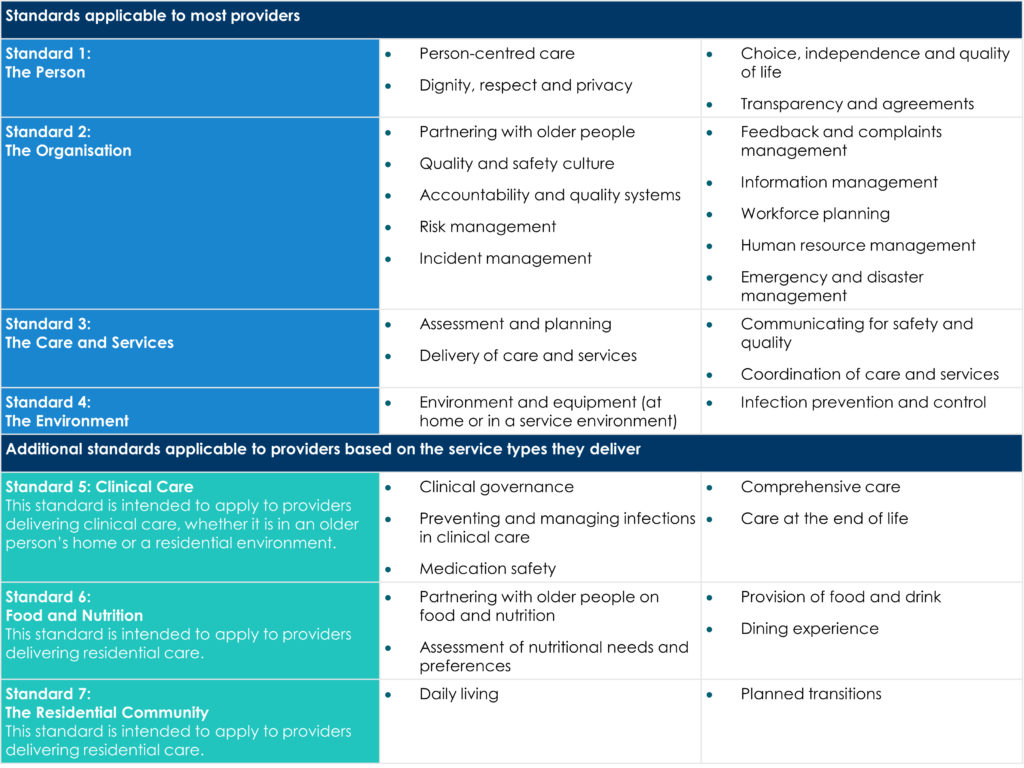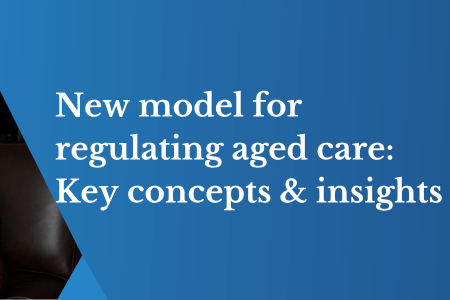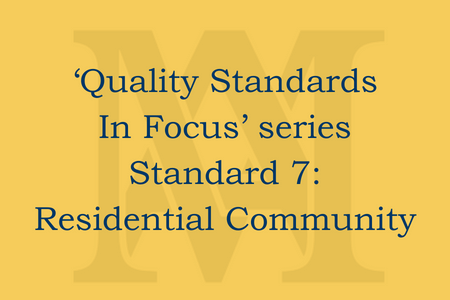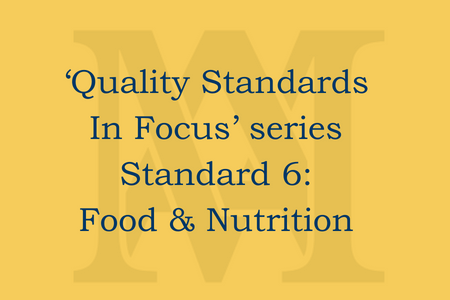The new Quality Standards – here’s what you need to know
October 27, 2022 | Quality

By Katie Airey, Quality, Risk and Compliance Lead
As part of the Aged Care reform, the Department of Health and Aged Care (DoHAC) are undertaking a review of the Quality Standards. On the 17th October 2022 the DoHAC held the Launch of Aged Care Quality Standards review consultation webinar.
The DoHAC advised it has revised the Aged Care Quality Standards to ensure that they are:
- Easier to understand
- Relevant to more aged care services
- More measurable
- Easier to implement
These revisions were developed based on feedback from older Australians, their families, and stakeholders across the aged care sector.
Where are we now?
Currently the DoHAC are seeking feedback on the revised version of the Quality Standards, through focus groups and surveys.
You can register to join focus groups here
What are the revised Quality Standards?
The revised Standards have been reduced to 7 Standards in total, they retain some existing concepts and strengthen focus on other concepts.

What’s changed?
Standard 1 – The person
Like the current Standards, Standard 1 has a focus on the older person
Key changes:
| Retains the existing concepts | Strengthens the focus on | |
| • Treating older people with dignity and respect • Valuing individual culture and diversity • Respect privacy • Current, accurate and timely information | • Person-centred care • Culturally safe care • Trauma aware and healing informed care • Decision-making • Dignity of risk |
Standard 2 – The Organisation
Draws on Standards 6,7 and 8 from the current Quality Standards
Key changes:
| Retains the existing concepts | Strengthens the focus on | |
| • Supporting older people to make complaints, responding to complaints, open disclosure and using complaints to inform improvements • Worker competency, training and support and monitoring working performance | • Partnering with older people to inform care and services • Quality and safety culture • Accountability and quality systems • Workforce planning • Emergency and disaster management |
Standard 3 – Care and Services
Draws on standard 2 along with parts of Standards 3 and 4 from the current Quality Standards
Key changes:
| Retains the existing concepts | Strengthens the focus on | |
| • Assessment and Care planning – which includes more detailed requirements regarding the matters to be captured in care plans and how care plans inform care delivery | • Delivering care and services in a way that supports independence and quality of life • Supporting people living with dementia • Communicating regarding an older persons care and services • Coordination of care |
Standard 4 – The Environment
Draws on Standard 5 along with parts of Standard 3 from the current Quality Standards
Key changes:
| Retains the existing concepts | Strengthens the focus on | |
| • Safe, clean and well-maintained service environments • Service environment that enables people to move freely indoors and outdoors • Fit for purpose equipment | • Environmental risk assessment in an older person’s home • Infection prevention and control |
Standard 5 – Clinical Care
Draws on parts of Standards 2, 3 and 8 from the current Quality Standards
Key changes:
| Retains the existing concepts | Strengthens the focus on | |
| • Delivering care in line with the persons assessed needs, goals and preferences • Implementing a clinical governance framework • Antimicrobial stewardship • Maximising dignity for older people nearing end of life | • Use of digital clinical information systems • Medication safety • Reducing and managing specific clinical risks – (High risk/ High occurring risks eg. falls, continence) |
Standard 6 – Food and Nutrition
Expands significantly on parts of Standards 2 and 4 of the current Quality Standards
Key changes:
| Significantly strengthens the requirements around food and nutrition, including |
| • Partnering with older people to provide a quality food services • Assessing each person’s nutritional needs, including what and how the person likes to eat and drink • Provision of food and drink, including menu design, choice and flavourful meals • Providing an enjoyable dining experience |
Standard 7 – Residential Community
Draws on parts of Standards 3 and 4 from the current Quality Standards
Key changes:
| Retains the existing concepts | Strengthens the focus on | |
| • Participate in activities that promote their emotional, spiritual and psychological well-being • Have social and personal relationships | • Minimising boredom and loneliness • Supporting people to contribute to their community • Protecting psychological safety • Transitioning people to and from the service • Connections with specialist dementia care services |
Further information such as guidance material will become available in 2023.
After the consultation period (between 17 October 2022 – 25 November 2022, the DoHAC will run a pilot of the revised Quality Standards. The pilot is planned to be undertaken in 2023.
You can learn about each standard in detail in our Quality Standards in Focus series:
Standard 3: The Care & Services
Standard 7: Residential Community
If you’d like to understand more about any issues related to quality, risk and compliance please get in touch.


